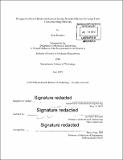Design of a novel electromechanical gastric resident device for long term controlled drug delivery
Author(s)
Koeppen, Ryan(Ryan P.)
Download1130582064-MIT.pdf (8.251Mb)
Other Contributors
Massachusetts Institute of Technology. Department of Mechanical Engineering.
Advisor
Giovanni Traverso.
Terms of use
Metadata
Show full item recordAbstract
Medication non-adherence is a global problem in health which has drastically hindered efforts to eradicate widespread diseases such as tuberculosis. Non-adherence has adverse effects on treatment efficacy and in the area of infectious disease it can increase the likelihood of developing antibiotic resistance to treatments. Despite global intervention efforts, non-adherence persists because the burden of administering medication is often placed directly on patients. One proposed strategy for overcoming non-adherence is the use of gastric resident devices, which are devices that hold large doses (-10-100 grams) of medication and deliver the medication in a controlled manner over long time periods (on the order of a month). Most gastric resident devices developed to date do not have the ability to load large doses of medication and release the pills in a controlled, pulsatile manner. Instead, they rely on continuous release processes which may not be sufficient for many treatments. This thesis details the design of a gastric resident device which can load approximately one week of medication and release the medication at a frequency of one pill per day using an electromechanically-driven mechanism. The device contains onboard electronics and a miniature direct current (DC) motor to drive a linkage that creates a reciprocating, linear motion at the output link. Intermediate, proof-of-concept tests were conducted to validate material choice, mechanism functionality, and mechanism reliability. A bench level prototype was developed and demonstrated the ability to release six pills from the action of controlled, electrical triggering only. Future work is being done to incorporate retention capabilities and self-contained electronics to make the device safe and autonomous for in vivo testing.
Description
Thesis: S.B., Massachusetts Institute of Technology, Department of Mechanical Engineering, 2019 Cataloged from PDF version of thesis. Includes bibliographical references (pages 69-70).
Date issued
2019Department
Massachusetts Institute of Technology. Department of Mechanical EngineeringPublisher
Massachusetts Institute of Technology
Keywords
Mechanical Engineering.